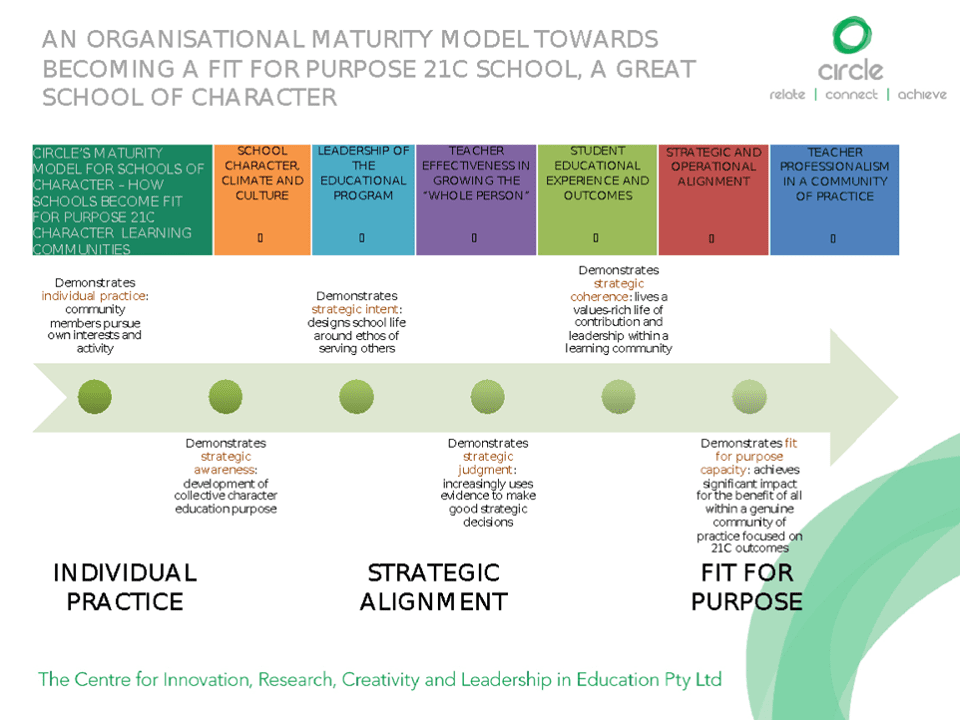Game Changers | Work | High Performance Culture
Organisational Maturity and Cultural Competency in a High Performing School
The standards of a high-performance school cannot be attained overnight. The reality is that schools experience the ebb and flow of normal daily life. It is unfeasible to expect perfection of any culture and the institution which it sustains. At a School For Tomorrow, we believe it is healthier instead to consider the organisational maturity of a school on its learning journey towards becoming a great 21C school, a school for character. This will help us to make sense of the standards and how to use them.

Our Model for the Organisational Maturity of a School of Character shows us how to think through this learning journey. On this, we assess progress and set goals for development based on a global and summative judgment of where a school is best placed on a continuum that looks at how practice is organised – from a school which is really a collation of the individual practice of its faculty, to one where the faculty are aligned to the strategic educational work of the school in pursuing an education for character and competency, to one which has authentic fit for purpose capacity in achieving significant benefit for all (and especially improved 21C outcomes for students) revealed significantly through the warp and weft of the community of inquiry and practice. Along the way, this will require the members of faculty themselves to grow in strategic awareness, to acquire a strategic intent that is translated into their daily practice, to apply strategic judgment in their decision-making, and to draw together what they do into a rationale, narrative and accompanying methodologies that are coherent in their formation and relationship to each other.

How a school goes about creating the conditions through which such an organisational maturity might be realised is largely about the exercise of cultural competency.
What do we mean by cultural competency in a fit for purpose school? This refers to the character and competency that we show as we make and implement plans to create a high-performance culture in a whole education in a school.
Knowing the way
- Cultural standards: Setting high expectations and high standards for students and teachers, ideally involving students and teachers in setting these standards, and systems of clear communication, review and feedback on achievement.
- Student potential for success: Believing that all children are capable of success and should be supported to set goals and achieve them regardless of their background and socio-economic situation.
- Community of inquiry and practice: Building a propensity towards continuous improvement through an evidence-based and research-driven community of inquiry and practice.
We cannot become static or fixed in our approach. Our established and honourable traditions, rituals, and habits help to ground us, but they must not imprison us along the way. We need to be respectful of the school of yesterday, attentive to the urgent needs of the school of today, and always mindful of the primacy of building the culture of the school of tomorrow. Growth-minded change leadership equips us to do this task.
Going the way
- Adaptive expertise: Supporting teachers to become instructors and researchers with adaptive expertise within the context of the changing nature of our world, and the changes to the educational, human, technological and other systems that support it.
- Professional self-efficacy: Encouraging teachers to take responsibility for their professional learning and conduct to meet the expectations and mission of the school, and the external standards for teachers.
- Instructional leadership: Training and promoting effective teachers to lead for change and take on more responsibility for leading teaching and learning.
Showing the way
- Valuing education: Placing a high value on education that is tangibly reflected through levels of funding, attitude, support, community involvement, and support.
- Valuing teachers: Encouraging school stakeholders to take concrete actions to connect with, support and value teachers, through recognising the importance of their work and understanding that their profession is complex.
- Valuing improvement: Developing teachers through mentoring, classroom observation, and constructive feedback to become more professional and more collaborative in all areas of practice, especially in tracking and diagnosing the nature and progress of an individual child’s learning.
At the heart of all of this is the imperative for growth and change. Schools and the teachers in them are strategically and operationally engaged in a continuous process of supporting the learning of children while they grow into their adulthood. This necessarily and naturally involves helping them to master the processes of change that are normal (and sometimes abnormal) in their lives. What we know from the past few decades of educational and organisational research is that we too must be engaged in a parallel process of growth-minded development. We cannot become static or fixed in our approach. Our established and honourable traditions, rituals, and habits help to ground us, but they must not imprison us along the way. We need to be respectful of the school of yesterday, attentive to the urgent needs of the school of today, and always mindful of the primacy of building the culture of the school of tomorrow. Growth-minded change leadership equips us to do this task.






